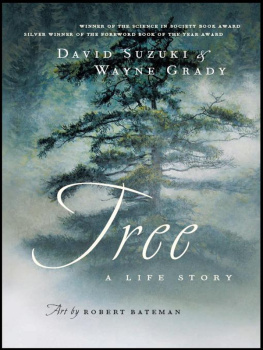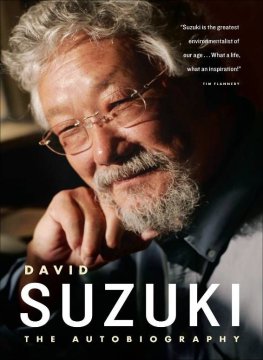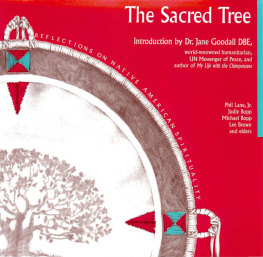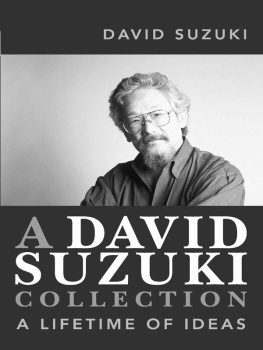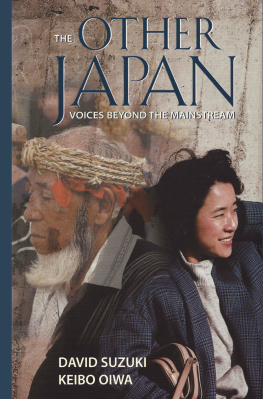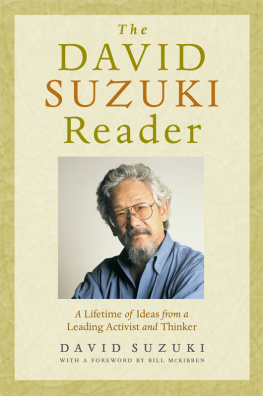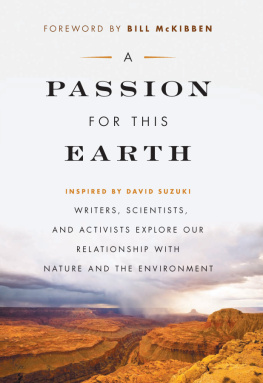Acknowledgments

We would like to thank ke Hultkrantz, Andrs Lopez, Alfonso Ortiz, and Robin Ridington for their expert review and constructive criticisms of all or parts of earlier versions of this manuscript. Each of them also candidly discussed aspects of the books themes or offered valuable suggestions concerning possible sources, as did Deborah Bird Rose, Pam Colorado, Harvey Feit, Joan Halifax, Richard Lee, Claude Lvi-Strauss, Nicolas Peterson, and Darryl Posey, among others. However, we alone assume responsibility for the words we have written.
We gratefully acknowledge the authors, scholars, and informants Native and non-Native whose cited interpretations of indigenous thought constitute the heart of this book. Our thanks also to Thomas and Deborah Bird Rose for their generosity in providing us valuable unpublished materials. Finally, we express our gratitude to our editor, Leslie Meredith, and her staff, and to Viola Thomas, our Native cultural consultant in Vancouver, for their steadfast commitment to the spirit of this project and their expert attention to the style, accuracy, and accessibility of our writings.
Appendix

Excerpt from Draft United Nations Declaration on the Rights of Indigenous Peoples by the United Nations Working Group on Indigenous Populations, reflecting an emerging international consensus on the rights of First Peoples around the world (August 26, 1994)
PART I
Article 1
Indigenous peoples have the right to the full and effective enjoyment of all human rights and fundamental freedoms recognized in the Charter of the United Nations, the Universal Declaration of Human Rights and international human rights law.
Article 2
Indigenous individuals and peoples are free and equal to all other individuals and peoples in dignity and rights, and have the right to be free from any kind of adverse discrimination, in particular that based on their indigenous origin or identity.
Article 3
Indigenous peoples have the right of self-determination. By virtue of that right they freely determine their political status and freely pursue their economic, social and cultural development.
Article 4
Indigenous peoples have the right to maintain and strengthen their distinct political, economic, social and cultural characteristics, as well as their legal systems, while retaining their rights to participate fully, if they so choose, in the political, economic, social and cultural life of the State.
Article 5
Every indigenous individual has the right to a nationality.
PART II
Article 6
Indigenous peoples have the collective right to live in freedom, peace and security as distinct peoples and to full guarantees against genocide or any other act of violence, including the removal of indigenous children from their families and communities under any pretext.
In addition, they have the individual rights to life, physical and mental integrity, liberty and security of person.
Article 7
Indigenous peoples have the collective and individual right not to be subjected to ethnocide and cultural genocide, including prevention of and redress for:
(a) Any action which has the aim or effect of depriving them of their integrity as distinct peoples, or of their cultural values or ethnic identities;
(b) Any action which has the aim or effect of dispossessing them of their lands, territories or resources;
(c) Any form of population transfer which has the aim or effect of violating or undermining any of their rights;
(d) Any form of assimilation or integration by other cultures or ways of life imposed on them by legislative, administrative or other measures;
(e) Any form of propaganda directed against them.
Article 8
Indigenous peoples have the collective and individual right to maintain and develop their distinct identities and characteristics, including the right to identify themselves as indigenous and to be recognized as such.
Article 9
Indigenous peoples and individuals have the right to belong to an indigenous community or nation, in accordance with the traditions and customs of the community or nation concerned. No disadvantage of any kind may arise from the exercise of such a right.
Article 10
Indigenous peoples shall not be forcibly removed from their lands or territories. No relocation shall take place without the free and informed consent of the indigenous peoples concerned and after agreement on just and fair compensation and, where possible, with the option of return.
Article 11
Indigenous peoples have the right to special protection and security in periods of armed conflict.
States shall observe international standards, in particular the Fourth Geneva Convention of 1949, for the protection of civilian populations in circumstances of emergency and armed conflict, and shall not:
(a) Recruit indigenous individuals against their will into the armed forces and, in particular, for use against other indigenous peoples;
(b) Recruit indigenous children into the armed forces under any circumstances;
(c) Force indigenous individuals to abandon their lands, territories or means of subsistence, or relocate them in special centres for military purposes;
(d) Force indigenous individuals to work for military purposes under any discriminatory conditions.
PART III
Article 12
Indigenous peoples have the right to practise and revitalize their cultural traditions and customs. This includes the right to maintain, protect and develop the past, present and future manifestations of their cultures, such as archaeological and historical sites, artifacts, designs, ceremonies, technologies and visual and performing arts and literature, as well as the right to the restitution of cultural, intellectual, religious and spiritual property taken without their free and informed consent or in violation of their laws, traditions and customs.
Article 13
Indigenous peoples have the right to manifest, practise, develop and teach their spiritual and religious traditions, customs and ceremonies; the right to maintain, protect, and have access in privacy to their religious and cultural sites; the right to the use and control of ceremonial objects; and the right to the repatriation of human remains.
States shall take effective measures, in conjunction with the indigenous peoples concerned, to ensure that indigenous sacred places, including burial sites, be preserved, respected and protected.
Article 14
Indigenous peoples have the right to revitalize, use, develop and transmit to future generations their histories, languages, oral traditions, philosophies, writing systems and literatures, and to designate and retain their own names for communities, places and persons.
States shall take effective measures, whenever any right of indigenous peoples may be threatened, to ensure this right is protected and also to ensure that they can understand and be understood in political, legal and administrative proceedings, where necessary through the provision of interpretation or by other appropriate means.



